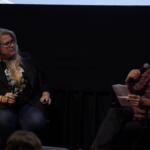
Shuming He didn’t make it easy for himself.
His first feature film as a director is a deeply personal dramedy about a widowed housewife as she steps out of her comfort zone by making a solo trip to South Korea. It stars a veteran Singaporean television actress in her first leading role and features a coming-out subplot in a country that has only recently legalized gay sex.
Nonetheless, “Ajoomma,” whose title translates to “Auntie” (a general term of respect as opposed to a family-specific designation), has been chosen as Singapore’s contender for this year’s Best International Feature Film. The filmmaker sat down with TheWrap’s Steve Pond to discuss the ins and (coming) outs of his deeply personal directorial debut.
“Korean drama was a phenomenon around eight years ago, a very recent thing,” noted He. “When I was growing up I watched a lot of Hong Kong dramas and, at some point in the 90s, Japanese dramas were huge. Korean drama was a new thing.
“But I had to force myself to like the kind of Korean dramas my mom watched. She’s not a fan of zombie dramas.” He remarked that his mother still watched and enjoyed “Squid Game” and “Parasite,” but remarked that the Netflix streaming series was “too violent for me.”
The film was inspired by his mother and inspired by women around him. He challenged his team to think “What would your mother do?” “We incorporated mother-isms of our team into this character’s life.”
He discussed the challenges of getting investors interested, as a first-time filmmaker no less, in a film centered on a middle-aged woman in South Korea.
“Producers and studio executives would say ‘Why don’t you set the film in China, with a mainland Chinese auntie instead of a Singapore auntie? It (China) is a bigger marketplace, we don’t know anyone in Singapore.’ There was a lot of fighting toward that, even in Asia.
“You hear things like that and you’re like, “I want to want to make it even more now.”
He remarked that since South Korea has an ecosystem of its own, there was less incentive to agree to a co-production with Singapore.
The writer/director also noted that Hong Huifang, who plays the protagonist “Auntie,” was a Singapore television actress whom the director had grown up watching. She is a longtime supporting actor, and the filmmaker relished a chance to cast her in her first lead role.
He claimed that the actresses exclaimed, “I had no idea I’m the lead, I’m in every scene, I just thought I was playing the mom of some guy!”
He said, with an almost gleeful grin, that he responded “The film is called ‘Ajooma,’ who do you think it means?” She was thrilled at the opportunity, as (not unlike Hollywood) there are not a huge variety of roles for “women of a certain age.”
He Shuming discussed creating the fictional Korean television drama with which Huifang’s protagonist is obsessed, which was apparently authentic enough to fool fans into briefly believing their authenticity. He noted (jokingly) that it was a secret pitch to Korean TV executives. “If you ever need a new Korean drama writer/director, I’m here!”
The filmmaker discussed the core relationship, namely two key characters who don’t speak the same language. He admitted that he speaks very little Korean and learned a little bit before shooting the picture.
“At a certain age, it’s just impossible to learn a new language.” He relied heavily on a translator, a Singaporean actress who lives in Korea who speaks “English, Singlish, Korean (and) Mandarin.” “I needed someone who could talk to the actresses in a way actors would understand.”
“A whole point of the film is that… they don’t speak the same language yet they can still understand each other.”
When asked about the biggest challenges he faced while shooting the picture, He noted that while the language barriers were challenging, the biggest obstacle was self-doubt as a first-time filmmaker. “Am I taking myself too seriously?”
He reminded himself, while in production this past January that to just shoot a movie at all (while employing some of his in-industry friends who had struggled to find such work amid the Covid pandemic) was a privilege unto itself.
The director discussed the film’s climactic moment whereby the main character’s son comes out (as gay). He noted that Singapore was a comparatively conservative country and that the government had only just this year repealed laws against gay men having sex. The film was released in Singapore this past October and nabbed an NC-16 rating entirely (according to the filmmaker) due to the respective plot point.
“It’s important to feature that because it’s important to see how she deals with it. It’s part of her journey.” He noted how the son’s coming out to his mother, a parent who has known that her son is gay, runs in tandem with the core arc. The son wants to have a life of his own, just as does our heroine.
Before taking questions from the audience, moderator Steve Pond asked about how the filmmaker’s mother reacted to seeing the film. Her first reaction, while noting that she enjoyed the film, was to ask her son why the main character was so sad, but a repeat viewing (with her friends) seems to have improved her critical disposition.
“Everything I have to say (to my mom),” He noted with a wry laugh, “I said it in this film.”
Watch the full interview here or in the video below.
















